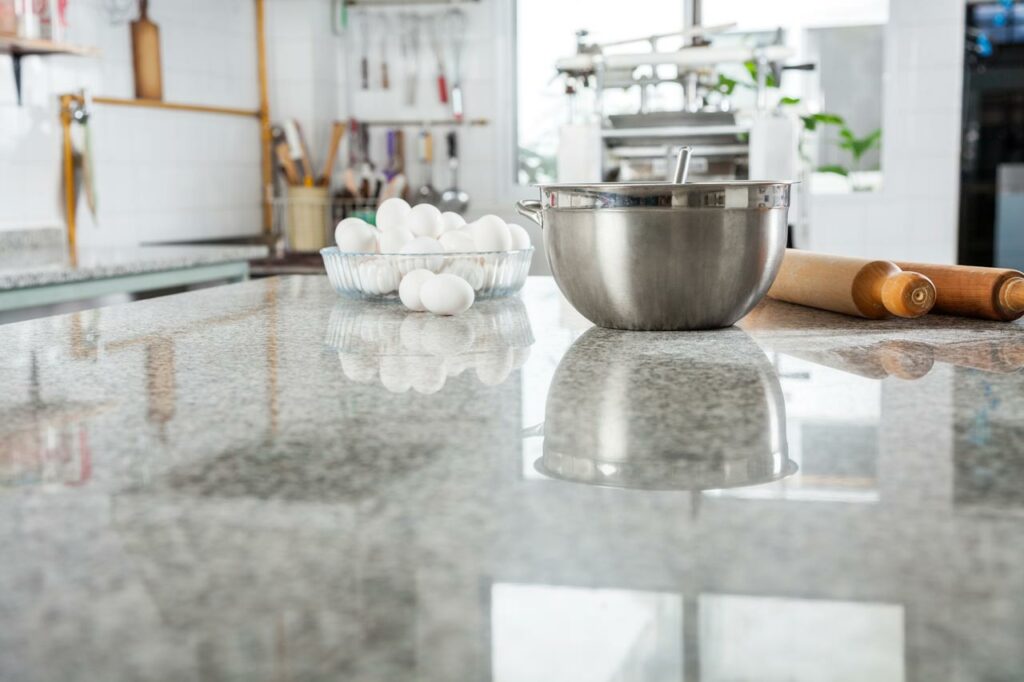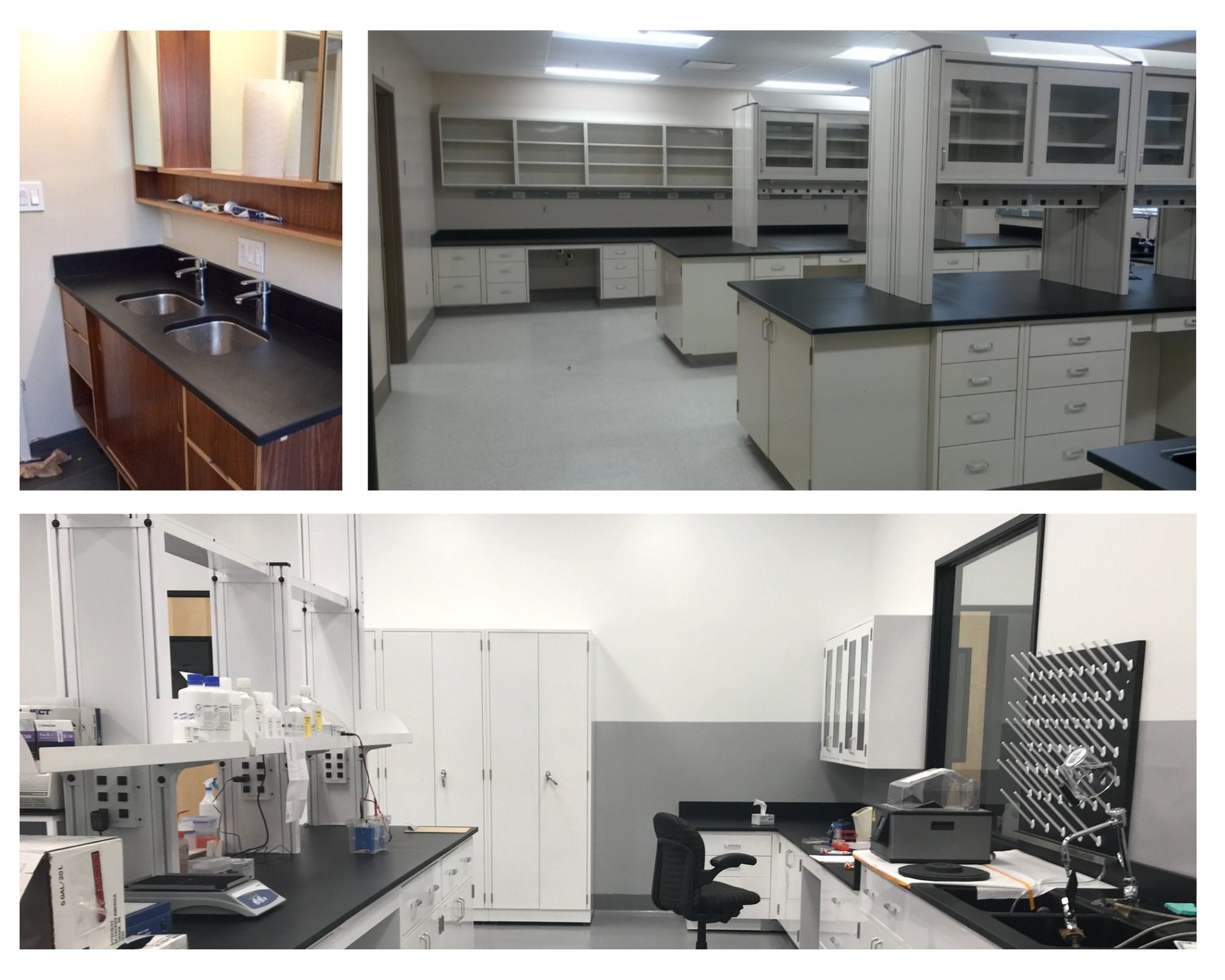Lightweight yet resistant to most things like bacteria, chemicals, and moisture – Phenolic Resin is quickly becoming the top choice for countertop material. Compared to more expensive and more well known epoxy resin countertops, phenolic resin countertops are lighter, more affordable, and more easily available.
How to Make Phenolic Resin
The primary difference with phenolic and epoxy resin lies in their manufacturing process. While epoxy resin is made of naturally occurring resin sourced from plants, phenolic resin is made from synthetic polymer.
Phenolic resin countertops are made by heating synthetic polymers to create a non-porous material that has moisture resistance, stain resistance, fungal and bacterial resistance, chemical resistance, corrosion resistance, as well as sunlight resistance and some heat resistance.
These phenolic resin properties allow it to withstand continuous heat exposure and UV rays from direct sunlight exposure. Ultimately, phenolic resin offers the same benefits as epoxy resin but are lighter and more affordable.
As phenolic resin surfaces are resistant to most things, phenolic resin countertops are a top choice for work surface material. Though they’re also popular for bathrooms and laboratory counters, they are most sought after as laboratory work surfaces as they easily resist high heat, moisture, and chemicals and are easily the perfect countertop for most laboratories.
Different Types of Resin Countertop Options
Resin is a thick, viscous material that hardens into a highly durable surface. This is used to create countertops and is a preferable choice because of its high customization. It can be sourced naturally from plants to form epoxy resin, or created synthetically to create phenolic resin. Such a material is resistant to chemicals, bacteria, fungi, and also to moderate high temperatures.
Read below to find out the different resin top options for your laboratory needs.
Solid Resin
One of the most popular countertops today is solid resin. Solid phenolic resin and epoxy resin countertops are made by pouring liquid resin into a mold, then leaving it to cure.
Once the resin mixture completely dries and hardens, the result is a solid surface composite panel that is durable, moisture resistant, chemical resistant, corrosion resistant, and for the most part, heat-resistant. This allows it to withstand spills, exposure to caustic chemicals, and frequent cleaning, which makes it an ideal countertop for laboratories, restrooms, and wet labs.
Backlighting Resin
As resin is an incredibly versatile material, a resin countertop can range from transparent to fully opaque. It comes in various designs and depth which, when lit from behind, can look absolutely stunning.
A popular way of designing decorative countertops is through backlighting. Backlighting resin countertops involves installing fluorescent lamps, light bulbs, or LED panels beneath the countertop. The lighting showcases the intricate layers and details within the resin slab, which can transform the mood of any room it’s in.
Embedded Glass or Tile
Also known as mosaic countertops, resin countertops can be embedded with glass or tiles to create a unique mosaic like show-stopper. This is created by embedding small pieces of varying colors and textures of glass or tiles, often recycled, into resin or concrete.
From a manufacturing standpoint, this is a cost-effective way of designing a resin counter since the materials are mostly recycled and the aesthetic is beyond plain. Not to mention, the inclusion of glass or tile also serves to further strengthen the resin countertop making it even more tear resistant and heat-resistant.
Resin with Added Minerals
Just as with pieces of leftover glass or tiles, minerals can also be added to resin countertops for design purposes. Natural slabs of stones for countertops always look amazing, but they are incredibly pricey. Adding minerals to a resin countertop gives you the look of stone or even marble at a much lower cost.
Granite and Resin Countertop Coverings
Get the look of granite without the hefty price tag when you mix resin and granite to form a beautiful countertop. These countertops are 95% granite with a bit of resin. This makes it a cost-effective alternative as it is 10% to 15% cheaper than solid granite, and it also makes the countertop more durable than pure granite or solid resin.
Other Types of Countertops
With many types of countertops available today, phenolic resin laboratory countertops are just one of your many options. Depending on your lab design, you can even opt to . Here are some other
Marble
Marble is a type of rock that is incredibly heavy and durable. It is also very expensive. Marble countertops are statement pieces that can easily increase your property value. Moreover, with proper care, marble countertops can last a really long time.
Wood
Wood is one of the most readily available naturally sourced materials for making countertops. This makes them sustainable, widely available, and come in a wide range of prices. Though wood countertops are more prone to denting, moisture damage, and cannot handle heat very well, they remain a popular choice for many home interiors.
Concrete
Concrete is readily available, more affordable, and easy to work with. They are also durable and though they can crack, their cracks are easily repairable compared to other types of countertops. Though they are not the top choice in terms of aesthetics, their durability make them a good option.
Laminate
Laminate countertops are made by laminating plastic phenolic resins into multiple layers of natural kraft papers. The resulting slab is then wrapped with a thin layer of melamine resin for decoration and to resist scuffs. Compared to other countertops, laminate versions are less durable. However, they are incredibly light-weight and offer sufficient durability and resistance to scratches and heat for basic use at a lower cost.
Outfit Your Lab Design With Resin Countertops
Phenolic resin countertops have heat resistance, chemical resistance, and corrosion resistance. This means there are several applications of phenolic resin available. Indeed, epoxy resin and phenolic resin is the right countertop material for any and all laboratory environments.
Whatever design or aesthetic you are looking for, ResinTops can help you achieve it! We have over 30 years of combined sales and design experience, and we know exactly how to produce the phenolic resin countertop of your dreams. We only use the best materials that fit the industry standard, so we can give our customers the best results.
When you work with us, you can be sure that we’ll create countertops that are highly resistant to stress cracking and other wear and tear. Our countertops phenolic resin can fit a range of lab designs. Contact ResinTops and get a free quote today.
Frequently Asked Questions
How long do phenolic resin countertops last?
Phenolic resin countertops can last for many years with proper maintenance, possibly even decades. The durability phenolic resin countertops is one of the reasons they are highly favored for laboratory use.
Can phenolic resin countertops handle extreme heat?
Phenolic resin countertops are generally heat resistant, but they should not be exposed to extremely high temperatures or open flames. For environments with such conditions, it’s best to opt for materials specifically designed to handle extreme heat.
Can I cut directly on my phenolic resin countertop without damaging it?
It’s not recommended to cut directly on any countertop, including phenolic resin ones. Although it’s durable and scratch-resistant, direct cutting can eventually lead to visible marks and scratches. It’s best to use a cutting board.
How do I clean a phenolic resin countertop?
Phenolic resin countertops can be cleaned using a soft cloth and mild detergent. They’re highly resistant to chemicals, but it’s best to avoid harsh cleaning agents to preserve the finish.
Are phenolic resin countertops eco-friendly?
While the manufacturing process of phenolic resin is synthetic, many manufacturers strive to reduce environmental impact by using recycled paper in the production process. However, it’s not as eco-friendly as some natural materials like wood or natural stone.


